Seascape Alaska 5: Gulf of Alaska Remotely Operated Vehicle Exploration and Mapping
(EX2306)
Exploration Team
Naming every expedition participant in a telepresence-enabled mission is next to impossible! Many researchers from dozens of institutions across the country have provided input into the expedition plan and are expected to participate. However, we've assembled information about the members of the team who are physically onboard NOAA Ship Okeanos Explorer during the Seascape Alaska 5 expedition.
And of course, none of this exploration would be possible without the work of the dedicated NOAA Commissioned Officer Corps and civilians who operate NOAA Ship Okeanos Explorer as part of NOAA's fleet managed by NOAA's Office of Marine and Aviation Operations.

Merlin Best
Science Co-Lead (Biology), Fisheries and Oceans Canada
Merlin Best is a biologist with Fisheries and Oceans Canada based out of the Institute of Ocean Sciences (IOS) in Sidney, British Columbia, in the territory of the W̱SÁNEĆ Peoples including the MÁLEXEȽ (Malahat), BOḰEĆEN (Pauquachin), W̱JOȽEȽP (Tsartlip), SȾÁUTW̱ (Tsawout), and W̱SĺḴEM (Tseycum) Nations.
Merlin studied biology at Dalhousie University in Halifax, Nova Scotia and started their career at the Bedford Institute of Oceanography (BIO) as a technician in 2007. At BIO, they focused on the annotation of underwater imagery and study of sponge and coral taxonomy. Since 2019, they have built on and continued this work in their current role as an aquatic science biologist with the Integrated Conservation Monitoring Program in the Marine Spatial Ecology and Analysis Section at IOS. Their work now focuses on vulnerable marine ecosystems in the offshore region of British Columbia, contributing to the establishment and monitoring of the Tang.ɢwan – ḥačxwiqak – Tsig̱is Marine Protected Area. They coordinate a team of annotators that collect data from video and photos of deep-sea study sites, which include seamounts, cold seeps, hydrothermal vents, and mud volcanoes, each with their own unique biological communities and dynamics. Their taxonomic research has taken the form of published identification guides for sponges and corals, as well as a series of guides for species in situ on iNaturalist. They are currently working with colleagues at the University of Victoria and the Royal BC Museum on the taxonomy of the bubblegum corals found in the Northeast Pacific (genus Paragorgia). Over the years they’ve worked with various remotely operated vehicle (ROV) platforms, camera systems, trawls, and drones, and they are incredibly excited to explore the Gulf of Alaska with ROV Deep Discoverer and the NOAA Ocean Exploration team.
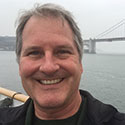
Jamie Conrad
Science Co-Lead (Geology), U.S. Geological Survey
Jamie Conrad is a research geologist with the U.S. Geological Survey’s (USGS) Pacific Coastal and Marine Science Center in Santa Cruz, California. He received his bachelor’s degree in earth science from U.C. Berkeley and a master’s degree in geology from San Jose State University. He began his career with the USGS working on mineral and ore deposit studies in the western U.S. and dating ore deposits and related igneous rocks using Argon geochronology. From 2006-2008 he did similar studies in Madagascar as part of a cooperative USGS-British Geological Survey project funded by the World Bank. His current research is focused on the seafloor geology of the U.S. west coast, and aims to help understand the hazards posed to coastal communities and infrastructure by offshore active faults and submarine landslides. Jamie has participated in numerous research expeditions in California, Oregon, and Alaska mapping the seafloor, collecting subbottom seismic profile data, and recovering sediment core samples from the seafloor.
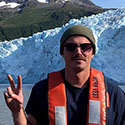
Sam Candio
Expedition Coordinator, NOAA Ocean Exploration
Sam Candio is a physical scientist with NOAA Ocean Exploration. He splits his time between conducting field operations aboard NOAA Ship Okeanos Explorer as an expedition coordinator/mapping lead and conducting shoreside responsibilities at the University of New Hampshire Center for Coastal and Ocean Mapping/Joint Hydrographic Center, including mission planning, data quality control, and data archiving. Sam received a bachelor’s degree in marine biology from the University of North Carolina, Wilmington (UNCW), with minors in environmental science and oceanography, and an associate degree in marine technology from Cape Fear Community College. Following graduation, he worked as an instructor for UNCW's MarineQuest, leading a suite of marine science experiential learning programs ranging from the generation of biodiesel from algae to the operation of side-scan sonars and remotely operated vehicles. Prior to signing on with NOAA Ocean Exploration, Sam spent four years aboard NOAA Ship Fairweather, serving as the chief hydrographic survey technician leading coastal bathymetric surveys in areas ranging from the Alaskan Arctic to California’s Channel Islands.
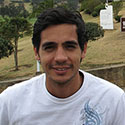
Fernando Aragon
Data Engineer, Global Foundation for Ocean Exploration
Fernando Aragon graduated from the University of Hawai‘i at Manoa with a bachelor’s degree in mechanical engineering. During his studies, he had experience in several fields including conceptual design, aerospace research, mechanical design, robotics and software development. From these activities he was able to intern for NASA at the Jet Propulsion Laboratory, present research at a national conference, and even co-author a technical paper in the Journal of the Astronautical Sciences. His most recent position was at the Field Robotics Laboratory (FRL), where he helped support operations, testing, and software development for two unmanned surface vehicles. From his time in FRL, he discovered a true passion for development and design of robotic systems. Originally from Colombia, Fernando enjoys outdoor activities and currently resides in State College, Pennsylvania.

Emily Ashe
Communications Specialist, NOAA Research
Emily Ashe is a communications specialist and science writer for the NOAA Office of Oceanic and Atmospheric Research (NOAA Research). She earned a Bachelor of Science degree from Eckerd College where she majored in marine science and minored in sustainability. She then went on to earn her master's degree in coastal zone management from the University of Miami Rosenstiel School of Marine, Atmospheric, and Earth Science.
Emily’s work at NOAA began at the Atlantic Oceanographic and Meteorological Lab before she joined the NOAA Research communications team at NOAA Headquarters. Currently, she creates content and manages various social media accounts as well as writes articles that communicate the work being done throughout NOAA Research. Outside of work, Emily loves to spend her time in and around the ocean going out on boats, tidepooling, and free diving.
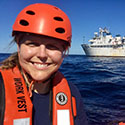
Caitlin Bailey
Video Editor, Global Foundation for Ocean Exploration
Caitlin Bailey became a member of the Global Foundation for Ocean Exploration video team and started sailing aboard NOAA Ship Okeanos Explorer in 2016. She is a “bi-polar” explorer, having been to both the Arctic and Antarctica, as well as a National Geographic Explorer. Caitlin is passionate about wildlife and sharing the deep sea and polar regions with a wide variety of audiences. She has a Master of Fine Arts in science and natural history filmmaking from Montana State University and a Bachelor of Science in animal biology from Texas A&M University-Corpus Christi. When not at sea, Caitlin resides in San Antonio, Texas, where she enjoys SCUBA diving, hiking, and entertaining her labradoodle, Camie.
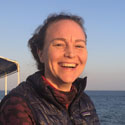
Amanda Bittinger
Mapping Watch Lead
Amanda lives in Portland, Oregon. She began her hydrographic career as a NOAA Corps Officer, and she has been sailing as a member of the Mapping Team on NOAA Ship Okeanos Explorer since 2015. She has 15 years of experience in surveying and mapping with a bachelor’s degree in oceanography and a master’s degree in coastal management with an emphasis on using remote sensing to determine coral reef health. In addition to serving as the mapping watch lead, she has also been the onboard mapping lead for several telepresence mapping expeditions. She has an interest in coastal remote sensing, and she likes to teach explorers-in-training, design t-shirts, and do other creative art projects onboard.

Roland Brian
Video Engineer, Global Foundation for Ocean Exploration
Roland Brian brings 38 years of electronics and satellite experience, with 29 of those years focusing on television and video engineering specialization. Throughout his early years in television, Roland worked to hone his skills and experience for various television stations and remote broadcasters as well as national broadcasters ranging from CBS, PBS, CNN, CNBC, MSNBC, ESPN, Fox Sports, and the Golf Channel. With a keen eye for precise high-quality, high-definition video, he really enjoys and helps bring the imagery to life for the viewers. Roland began his career in the U.S. Air Force where he worked as a satellite communications engineering technician with visions of working on the U.S. Space Station. He traded in that quest for one of deep-ocean exploration and sharing the beautiful imagery with the world. He has worked with NOAA Ocean Exploration since 2010 and plays an integral part in telepresence-enabled remotely operated vehicle (ROV) expeditions. He has also provided engineering design, integration, and operation services for other projects using various Global Foundation for Ocean Exploration (GFOE) and NOAA Ocean Exploration mobile telepresence systems. His duties aboard NOAA Ship Okeanos Explorer include operation and maintenance of the ship's telepresence and video and satellite systems, including those on ROVs Deep Discoverer and Seirios. Again, Roland’s experience embodies the breadth and depth of knowledge that GFOE and NOAA Ocean Exploration encourage. When not at sea, Roland enjoys life with his wife and family in sunny Sarasota, Florida.
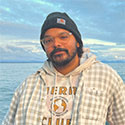
Treyson (Trey) Gillespie
Mapping Watch Lead, NOAA Ocean Exploration
Treyson (Trey) Gillespie lives in Charleston, South Carolina, and holds a bachelor's degree in geology and environmental Geosciences from the College of Charleston (CofC). He is currently pursuing a masters in environmental science and sustainability studies from the same institution. At CofC, Trey participated in the BEnthic Acoustic Mapping & Survey (BEAMS) program where he gained invaluable experience processing and analyzing multibeam bathymetric data. As a result, Trey had the opportunity to work and sail with a variety of international and domestic organizations such as Seabed 2030, Geological Survey Ireland, INFOMAR Project, the U.S. federal government as a NOAA explorer-in-training on several expeditions, and aboard a number of University-National Oceanographic Laboratory System (UNOLS) vessels in support of oceanographic science and as a mentor to undergraduate students. Since 2019, Trey has worked with academic, commercial, and governmental vessels to map our oceans in support of the greater scientific community. Trey serves as a mapping watch lead for NOAA Ocean Exploration and helps to train and mentor new generations of explorers-in-training aboard NOAA Ship Okeanos Explorer.
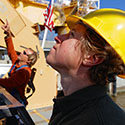
Todd Gregory
Mechanical Engineer, Global Foundation for Ocean Exploration
Todd Gregory received his bachelor’s degree in naval architecture and marine engineering from Webb Institute in 1999 and his master’s in ocean engineering from the University of Hawai‘i at Manoa in 2001. From 2002 to 2010, Todd was employed by the Institute for Exploration, where he served as the principal mechanical/hydraulic designer for remotely operated vehicle (ROV) Hercules. He has served as a guest investigator at the Woods Hole Oceanographic Institution, as an associate marine development engineer at the University of Rhode Island’s Graduate School of Oceanography, and as a mechanical engineering consultant to NOAA Ocean Exploration. Todd is the principal mechanical engineer for NOAA Ocean Exploration’s 6,000-meter-rated, two-body ROV system Deep Discoverer and Seirios and is one of the chief pilots during offshore operations. Todd currently resides in South Kingstown, Rhode Island.

Art Howard
Video Editor, Global Foundation for Ocean Exploration
For more than 30 years, Emmy-award winning photographer and producer Art Howard has helped viewers experience life through images from 50 countries and 7 continents. A native of North Carolina, Art has followed researchers aboard multiple deep-sea missions, documenting the excitement and challenges of exploration. Art uses the latest video technology to bring viewers as close as possible to life at sea, capturing both scientists and the marine life they seek to understand. Art has spent the last 11 years independently producing media for the North Carolina Museum of Natural Sciences.
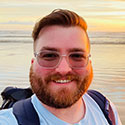
Mitch Hebner
Knauss Fellow, NOAA Ocean Exploration
Mitch Hebner is a 2023 Knauss Marine Policy Fellow with NOAA Ocean Exploration. He is originally from Albuquerque, New Mexico, where he cultivated a love for spicy food, cooking, and outdoor activities. He currently lives with his partner and two cats near Silver Spring, Maryland, after moving from Washington State where he completed his master’s degree at Western Washington University.
Mitch's research focuses on the larvae of a deep-sea snail that lives in cold seep ecosystems in the Gulf of Mexico. Specifically, he is examining how larval swimming and respiration rates are influenced by temperature changes due to long-distance vertical migration from the bottom to the surface of the Gulf of Mexico, and modeling the expended energy of the migrating larvae to help explain the distribution of the adult snail population. Mitch was fortunate to have met his advisor on a 2020 research expedition in the Gulf where they got to participate in a dive aboard human occupied vehicle (HOV) Alvin. They spent eight hours at a depth of 550 meters (1,804 feet) off the coast of Louisiana.

Nathaniel Kenney
Video Editor, Global Foundation for Ocean Exploration
Nate Kenney joined the Global Foundation for Ocean Exploration (GFOE) in the role of video editor in 2023. Nate comes with a five-year background as an editor and cinematographer, with a diverse background that includes working on narrative feature films and wildlife docu-series. He is a proud graduate of Montana State University's Science and Natural History Filmmaking program, where he earned a Master of Fine Arts. With a genuine appreciation for the natural world and a passion for storytelling, Nate is excited to apply his skills to GFOE's mission and create captivating content that advances our understanding of the ocean and its vast ecosystems.

Sean Kennison
Mechanical Engineer, Global Foundation for Ocean Exploration
Sean Kennison first joined the Global Foundation for Ocean Exploration in 2014 while earning his undergraduate degree at the Pennsylvania State University. He sailed on NOAA Ship Okeanos Explorer as part of the engineering team and assisted with various design projects throughout his senior year. Upon graduating at the top of his class with a bachelor’s degree in mechanical engineering and a minor in engineering mechanics, he joined the team full time. Sean regularly maintains the vehicles and continually works on improvements to keep them up-to-date with technological advances. He has gained invaluable experience and knowledge through the seasons, onshore and offshore, that has turned him into a versatile engineer. Initially starting as a passionate navigator, Sean has grown to become a skilled pilot and is a proven lead for the remotely operated vehicle expedition team.

Amanda Maxon
Environmental Compliance Officer, NOAA Ocean Exploration
Amanda Maxon is an Environmental Compliance Specialist contractor with Groundswell working on behalf of NOAA Ocean Exploration. With years spent working at universities and businesses around the globe, Amanda has a strong background in developing and implementing environmental compliance for marine-and terrestrial-based activities, and analyzing the impact of land usage and anthropogenic effects on the overall health and biodiversity in urban areas.
Amanda graduated from Texas Woman’s University where she obtained a bachelor’s degree in biology with a minor in chemistry and global studies with the intention of pursuing research on the interactions between humans and their relationships with ecological systems. Amanda earned her first master’s degree in environmental management and sustainable development from St. Edward’s University and the Université Catholique de l'Ouest in Angers, France, where she participated in various academic and research projects throughout Europe. To further pursue her goal of understanding the relationship between policymakers and scientists, Amanda earned a degree from the Professional Science Master’s in Biotechnology program at American University, where she focused primarily on environmental entrepreneurship and public policy.
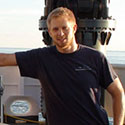
Jon Mefford
Mechanical Engineer, Global Foundation for Ocean Exploration
Jon Mefford holds a bachelor’s degree in aerospace engineering from the University of Texas and a master’s degree in mechanical engineering from the University of Hawai‘i. He began his career working as a software test engineer on the Space Shuttle program for several years before moving to Hawai‘i to pursue his master's degree. During his time as a graduate student, he participated in a number of research expeditions aboard NOAA Ship Okeanos Explorer as a member of the remotely operated vehicle (ROV) team. This experience was invaluable to him as he worked on his degree, which focused on the design, development, and implementation of control systems for marine robotics. Since that time, Jon has spent more than eight years working as a test and integration engineer on the Orion Space Program, occasionally returning to support expeditions with the Global Foundation for Ocean Exploration. He remains passionate about both space and deep-sea exploration and appreciates the many parallels that can be drawn between them. Jon currently resides in Denver, Colorado.

Bobby Mohr
Electrical Engineer, Global Foundation for Ocean Exploration
Bobby Mohr is a systems/robotics engineer specializing in autonomous and remotely operated underwater vehicles. He holds a bachelor’s degree in physics and graduated cum laude from Davidson College in 2009. Bobby started his career as an engineering technician with Greensea Systems where he was responsible for the design, development, and testing of autonomous underwater vehicle control systems. Bobby realized that he would enjoy the design-build process more if he was able to also pursue the challenges of making vehicles work successfully at sea. After serving on several projects at Greensea, where he specialized in electrical and software systems support, Bobby joined the Global Foundation for Ocean Exploration (GFOE) as an electrical systems engineer. During his time at Greensea and now with GFOE, he has been one of the key electrical engineers on the development of the 6,000-meter-rated remotely operated vehicle system of Deep Discoverer and Seirios.
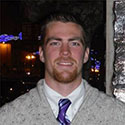
Lars Murphy
Ocean/Mechanical Engineer, Team Lead, Global Foundation for Ocean Exploration
Lars Murphy holds a bachelor’s degree in ocean engineering and a bachelor’s degree in Spanish from the University of Rhode Island. Growing up on the coast of Maine, he developed a constant pull toward the unknown, the unexplored, and chaotic environments and acquired a drive to bring meaning, understanding, and order to these areas. Lars has a professional background working with autonomous underwater vehicles and other subsea robotics systems both internationally and nationally and now supports remotely operated vehicles Deep Discoverer and Seirios as an ocean/mechanical engineer.

Andrew O'Brien
Data Engineer, Global Foundation for Ocean Exploration
Andrew (Andy) O’Brien started his professional career in the U.S. Navy, where he ran a small electronic test system calibration laboratory and instructed NATO students in satellite ground station repair. Following the Navy, he obtained a bachelor’s degree in history and a master’s in computer science from the University of Vermont before joining Greensea Systems as the lead software engineer. During his tenure at Greensea, Andy designed, developed, and supported over 40 widely varying custom robot control systems and their operator interfaces for government and industry. Notably, Andy was the software lead on NOAA Ocean Explorations remotely operated vehicles Deep Discoverer and Seirios. Andy so enjoyed working with NOAA Ocean Exploration, and supporting their exploration mission, that he asked to join them. Andy now splits his time between developing software, managing science and engineering data, maintaining the satellite communications system, and navigating, piloting, and co-piloting the deep-submergence vehicles. During his free time, you can often find him in Coventry, Rhode Island.
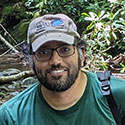
Arvind Shantharam
Sample Data Manager, National Centers for Environmental Information and NOAA’s Deep Sea Coral Research and Technology Program
Arvind Shantharam is a data manager and analyst for the National Centers for Environmental Information and NOAA’s Deep Sea Coral Research and Technology Program via the Northern Gulf Institute. He holds degrees in oceanography, ecology, and environmental science. His research background involves deep-sea benthic community and spatial ecology. Past sailing experience includes research expeditions in the Gulf of Mexico investigating the impact of the Deepwater Horizon oil spill, examining seamount coral recovery along the Hawaiian archipelago, and exploring the Mid-Atlantic Ridge on a past NOAA Ocean Exploration expedition aboard NOAA Ship Okeanos Explorer. During the Seascape Alaska 5: Gulf of Alaska Remotely Operated Vehicle Exploration and Mapping expedition, he will serve as sample data manager and assist in the processing of samples and ensuring accurate metadata collection.
Beyond research, Arvind enjoys the outdoors, museums, and learning about history.

Levi Unema
Electrical Engineer, Global Foundation for Ocean Exploration
Levi Unema is an Eagle Scout from Lynden, Washington. He holds a bachelor’s degree in electrical engineering along with a Certificate in Electric Power Engineering from Michigan Technological University. Levi joined the Global Foundation for Ocean Exploration (GFOE) in 2016 and designs, builds, operates, and maintains GFOE’s remotely operated vehicles. Since joining the team, he has acquired many technical skills in the satellite communication field, in addition to the broadcast video field. Levi sails on most remotely operated vehicle expeditions on Okeanos Explorer, satisfying the roles of electrical engineer, navigator, pilot, co-pilot, and sometimes VSAT (Very Small Aperture Terminal) engineer. Levi resides in Newport, Rhode Island.

Chris Wright
Data Engineer, Global Foundation for Ocean Exploration
Chris Wright holds a Bachelor of Science in business administration from the University of Mary Washington and a Master of Business Administration from Rollins College. After graduation, he worked as a network and systems administrator and engineer in the hospitality industry in the Northeast and Mountain West for more than 15 years. Recently relocating back to the East Coast, Chris joined the Global Foundation for Ocean Exploration (GFOE) data team in early 2019 as one of the newest members of the organization. In 2019, he completed his first expedition aboard NOAA Ship Okeanos Explorer and is extremely excited about continuing the journey to explore the oceans around the world. When he isn't sailing on Okeanos Explorer, he’s busy working in GFOE’s Quonset office planning, designing, and implementing data solutions to help refine and mature its base of operations for ocean exploration. Chris and his family currently reside in Newport, Rhode Island.